Nori Rat MMP-1 ELISA Kit
$461.00 – $832.00
DataSheet CoA SDS
This ELISA kit is for quantification of MMP-1 in rat. This is a quick ELISA assay that reduces time to 50% compared to the conventional method, and the entire assay only takes 3 hours. This assay employs the quantitative sandwich enzyme immunoassay technique and uses biotin-streptavidin chemistry to improve the performance of the assays. An antibody specific for MMP-1 has been pre-coated onto a microplate. Standards and samples are pipetted into the wells and any MMP-1 present is bound by the immobilized antibody. After washing away any unbound substances, a detection antibody specific for MMP-1 is added to the wells. Following wash to remove any unbound antibody reagent, a detection reagent is added. After intensive wash a substrate solution is added to the wells and color develops in proportion to the amount of MMP-1 bound in the initial step. The color development is stopped, and the intensity of the color is measured.
Alternative names for MMP-1: Matrix metalloproteinase-1, interstitial collagenase, fibroblast collagenase, MMP1
This product is for Laboratory Research Use Only not for diagnostic and therapeutic purposes or any other purposes.
- Description
- How Elisa Works
- Product Citation (0)
- Reviews (0)
Description
Nori Rat MMP-1 ELISA Kit Summary
Alternative names for MMP-1: Matrix metalloproteinase-1, interstitial collagenase, fibroblast collagenase, MMP1
| Assay Type | Solid Phase Sandwich ELISA |
| Format | 96-well Microplate or 96-Well Strip Microplate |
| Method of Detection | Colorimetric |
| Number of Targets Detected | 1 |
| Target Antigen Accession Number | B5DFD5 |
| Assay Length | 3 hours |
| Quantitative/Semiquantitative | Quantitative |
| Sample Type | Plasma, Serum, Cell Culture, Urine, Cell/Tissue Lysates, Synovial Fluid, BAL, |
| Recommended Sample Dilution (Plasma/Serum) | No dilution for sample <ULOQ; sufficient dilution for samples >ULOQ |
| Sensitivity | 18 pg/mL |
| Detection Range | 93.75-6000 pg/mL |
| Specificity | Natural and recombinant rat MMP-1 |
| Cross-Reactivity | < 0.5% cross-reactivity observed with available related molecules, < 50% cross-species reactivity observed with species tested. |
| Interference | No significant interference observed with available related molecules |
| Storage/Stability | 4 ºC for up to 6 months |
| Usage | For Laboratory Research Use Only. Not for diagnostic or therapeutic use. |
| Additional Notes | The kit allows for use in multiple experiments. |
Standard Curve
Kit Components
1. Pre-coated 96-well Microplate
2. Biotinylated Detection Antibody
3. Streptavidin-HRP Conjugate
4. Lyophilized Standards
5. TMB One-Step Substrate
6. Stop Solution
7. 20 x PBS
8. Assay Buffer
Other Materials Required but not Provided:
1. Microplate Reader capable of measuring absorption at 450 nm
2. Log-log graph paper or computer and software for ELISA data analysis
3. Precision pipettes (1-1000 µl)
4. Multi-channel pipettes (300 µl)
5. Distilled or deionized water
Protocol Outline
1. Prepare all reagents, samples and standards as instructed in the datasheet.
2. Add 100 µl of Standard or samples to each well and incubate 1 h at RT.
3. Add 100 µl of Working Detection Antibody to each well and incubate 1 h at RT.
4. Add 100 µl of Working Streptavidin-HRP to each well and incubate 20 min at RT.
5. Add 100 µl of Substrate to each well and incubate 5-30 min at RT.
6. Add 50 µl of Stop Solution to each well and read at 450 nm immediately.
Background:
Matrix metalloproteinase-1 (MMP-1) also known as interstitial collagenase and fibroblast collagenase is an enzyme that in Rats is encoded by the MMP1 gene.[1] MMP-1 has an archetypal structure consisting of a pre-domain, a pro-domain, a catalytic domain, a linker region and a hemopexin-like domain.[2] The Catalytic Domains of MMPs share very similar characteristics, having a general shape of oblate ellipsoid with a diameter of ~40 Å. The Catalytic Domain of MMP-1 is composed of five highly twisted β-strands (sI-sV), three α-helix (hA-hC) and a total of eight loops, enclosing a total of five metal ions, three Ca2+ and two Zn2+, one of which with catalytic role. The Catalytic Domain (CAT) of MMP-1 starts with the F100 (non-truncated CAT) as the first amino-acid of the N-terminal loop of the CAT domain. A specific region (183)RWTNNFREY(191) has been identified as a critical segment of matrix metalloproteinase 1 for the expression of collagenolytic activity.[3] On C-terminal part of the CAT Domain the hB α-helix, known as the “active-site helix” encompasses part of the “zinc-binding consensus sequence” HEXXHXXGXXH that is characteristic of the Metzincin superfamily.[4] The α-helix hB finishes abruptly at Gly225 where the last loop of the domain starts. This last loop contains the “specificity loop” which is the shortest in the MMPs family. The Catalytic Domain ends at Gly261 with α-helix hC. MMPs are involved in the breakdown of extracellular matrix in normal physiological processes, such as embryonic development, reproduction, and tissue remodeling, as well as in disease processes, such as arthritis and metastasis. Specifically, MMP-1 breaks down the interstitial collagens, types I, II, and III. Mechanical force may increase the expression of MMP1 in Rat periodontal ligament cells.[13] MMP1 has been shown to interact with CD49b.[14][15]
References
- Brinckerhoff CE, et al. (1987). Clin. Invest. 79 (2): 542–6.
- Li J, et al. (1995). Structure 3 (6): 541–9.
- Chung L, et al. (2000). Biol. Chem. 275 (38): 29610–7.
- Bode W, et al. (1993). FEBS Lett. 331 (1-2): 134–40.
- Huang SF, et al. (2008). J. Oral Sci. 116 (4): 319–23.
- Dumin JA, et al. (2001). Biol. Chem. 276 (31): 29368–74.
Be the first to review “Nori Rat MMP-1 ELISA Kit”
You must be logged in to post a review.























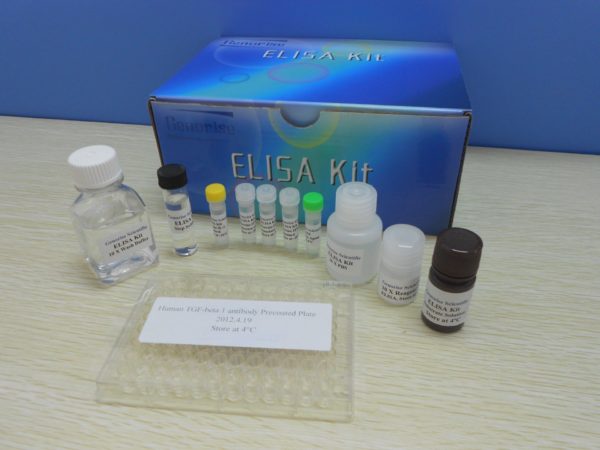
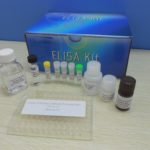
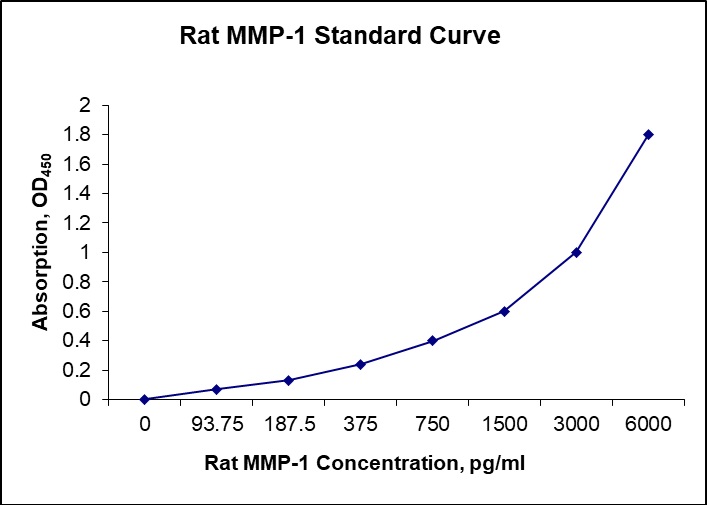
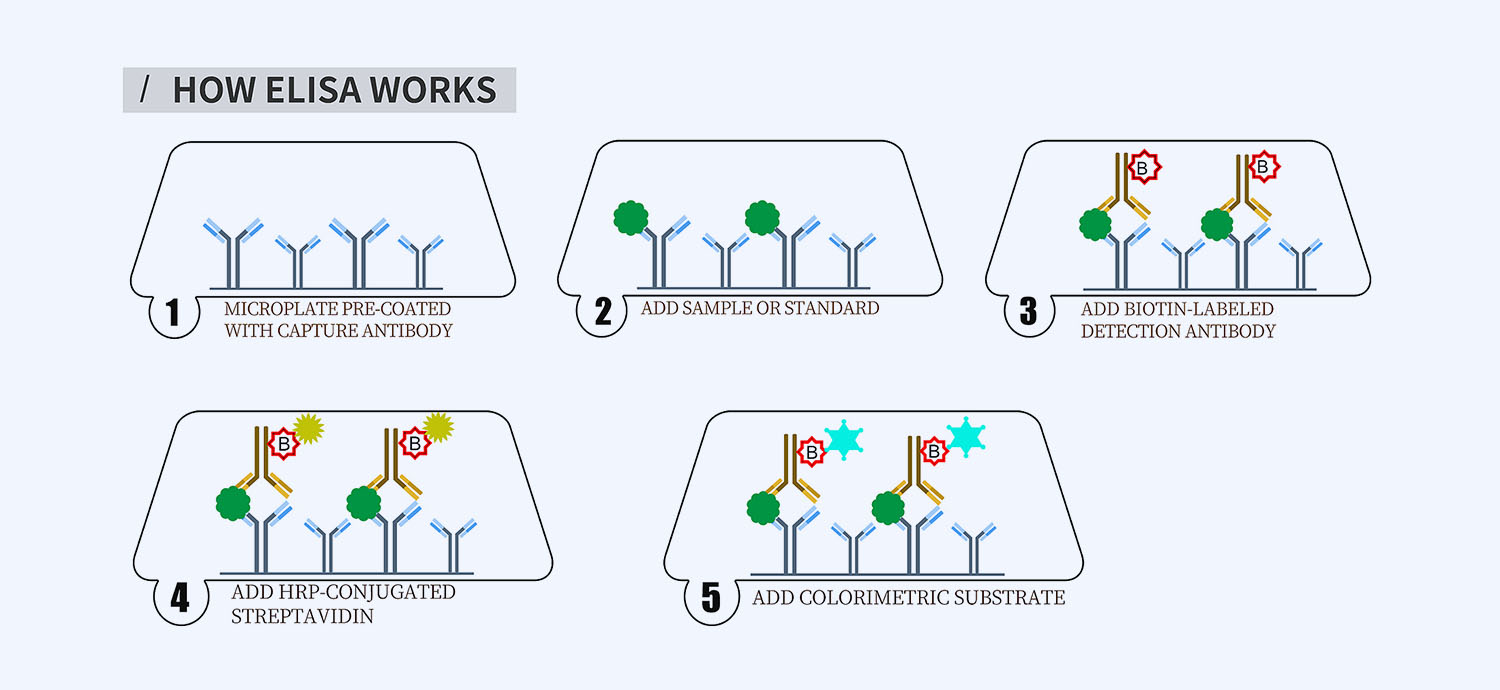
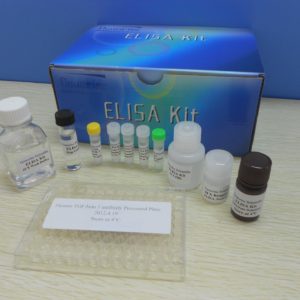
Reviews
There are no reviews yet.